Dance of Death (42 page)
Authors: Dale Hudson
As in previous trials, Mark and Donna Hobbs were unshakable in that they had seen John Frazier at the hotel and on the beach the night Brent Poole was murdered. The defense went after them, time and time again, shaking their heads and murmuring to the jury, “And how can you be so sure?”
Donna Hobbs testified that even seeing John again in the courtroom convinced her she was right. “When I first saw him, he made a certain move and I thought, âOh, no. He shouldn't have done that. It was the same move he made on the beach that night.'”
After the prosecution rested its case, the defense opened with the testimony of videographer Donald Smith. The long-awaited video, by Smith's video production company, Lucky Dog, produced for the first trial and two years after Poole's murder, raised a lot of concerns about whether the Hobbses could have seen John clearly enough that night to recall his face in the photographic lineup.
John's lawyers had also secured the services of university professors, Brian Cutler and Elizabeth Loftus, to explain mistaken eyewitness identification and memory selection. It all sounded plausible, but was the jury buying it? Even if they didn't, the defense maintained that the Hobbes' identification of John still didn't put him at the crime scene. If indeed they had seen him at the hotel, Martin postured, he was still some two blocks away from the crime scene.
A critical point in the trial arose when the defense called John's sister, Christine Micholatti, and his former roommate and exotic dancer, Sharon Haymaker, to testify that Renee Poole didn't mean anything to him. Both women insisted it wasn't a big deal to John for a girl to move in with him, have sex, then move out. John would always move on as if nothing had happened.
But on cross-examination of Micholatti, Hembree reminded her about John's Day-Timer, garnered in a search at his mother's beach home in February 1999. Listed among its pages were significant dates, such as the beginning of his and Renee's relationship, the first time they had sex, the day Renee moved in, and Katie's birthday. The last entry was written the day of, or the day, Renee moved out. The note read: “FUCK YOU RENEE!!”
Hembree continued to paint a clear picture of how upset John was when Renee moved back in with her husband. He wanted the jurors to see that John did care for her and believed he would have a future with her. Brent's sister, Dee Mishler, was called as a rebuttal witness and revealed a phone conversation she had with John.
“It was Mother's Day,” Mishler began. “Brent called me and said Renee was moving back home. He asked me if I would help him clean the house and get everything ready for her arrival.... He had grilled steaks and prepared a surprise dinner, but Renee never showed. And when it got very late that night, I called her on her cell phone. In a few minutes, John called me back.”
Mishler stated John was very upset and used vulgar language.
“I had never been called any of those names before. He used the âF' word, and told me my brother and family was âf-ing' crazy. Then it was G.D. this and G.D. that, and Renee was never coming home.... He was really angry.”
John was collapsing under the pressure. Up until Mishler's testimony, he had done very well holding his emotions. But as she walked away from the witness stand and past him, he quipped in a voice loud enough for her to hear, “Thanks for lying.” Mishler wheeled around, then leaned into Hembree and reported John's taunt. Hembree jumped up and demanded that John be reprimanded.
The jurors believed they were now seeing a side of John Frazier that had been cleverly disguised in court. In the eleventh hour, Mishler's testimony confirmed what they had suspected all along. Her words were the last words spoken from witnesses in reference to John's character and, no doubt, would carry a lot of weight in their final decision.
Still, there was hope for an acquittal.
Renee's parents, Jack and Marie Summey, had been present every day of the trial, sitting in the row behind John's family. After Martin announced, “The defense rests,” Jack leaned over to Marie and whispered, “If our daughter had gotten that type of defense from her lawyers, she wouldn't be sitting in prison today.”
As Fran Humphries began his closing argument, it looked as if the case could go either way. Humphries' job was to be brief and set the jury up for the final actâHembree's closing arguments. He looked a little sheepish, but was his usual calm and methodical self.
Tommy Brittain, on the other hand, came on like a roaring lion. For forty minutes, he preached that the state's case against John Frazier was all circumstantial and that they did not have one shred of evidence to prove him guilty. “And don't you think if there had been any evidence,” he boomed, “four law enforcement agencies and their forensics teams would have found something by now?”
Morgan Martin held the jury captive for seventy minutes as he went through a laundry list of the state's evidence and pointed out the discrepancies between that and the witnesses that testified. “All they did was infer that John had been at a certain place or committed a certain act,” Martin emphasized. “It's all circumstantial evidence. And you can't pile inference upon inference and call it evidence to say that a man has committed murder. . . . There is nothing here that rises to the level of a motive for murder.”
Martin apologized for the length of time he had taken, but wanted the jury to know a man's life was at stake here. Spectators in the courtroom squirmed and shifted from the discomfort of sitting so long in the wooden pews. One young attorney sitting behind the prosecution turned to his associate and whined, “We've been sitting so long that my ass is hurting.”
Greg Hembree had been silent during most of the trial, leaving a lot of the courtroom drama to Humphries. But the time had come in Hembree's career for him to reach deep inside of himself and grab hold of the best he had. He grabbed a fistful. Walking the jury through the entire scenario from beginning to end, Hembree explained how Poole and Frazier had plotted her husband's murder: they lured him on the beach, where Renee made love to him; they executed him; then they tried to cover it up. During the one hour and twenty minutes it took Hembree to make his case, John fidgeted in his chair with his head down, mumbling underneath his breath and shaking his head in quiet protest. Morgan Martin listened carefully to every word, determined not to let his opponent get by with some inferences he considered misleading. On four separate occasions, Martin rose to his feet and objected to Hembree's discourse, prompting Judge Thomas to intervene and call for a sidebar. Without realizing it, those short interludes of discussion may have benefited the prosecution more than the defense, in that it gave the jury periodic breaks to digest and ponder Hembree's final arguments.
“John Frazier did not kill Renee Poole,” Hembree pointed out in his closing remarks. “He left her alive because
he
wanted her. He wanted her, but he hated Brent Poole and wanted him dead.”
he
wanted her. He wanted her, but he hated Brent Poole and wanted him dead.”
But in the end, it was Hembree's reference to the movie and screenplay
Chicago
that would stand out and provide the greatest sting to Frazier's defense.
Chicago
that would stand out and provide the greatest sting to Frazier's defense.
“My daughter loves theater and we recently attended the production of
Chicago
,” he said. “And I remember the lines of Richard Gere's character, Billy Flynnâthe town's slickest lawyerâwho sang this song.” (Hembree then assured the jury he was not going to sing):
Chicago
,” he said. “And I remember the lines of Richard Gere's character, Billy Flynnâthe town's slickest lawyerâwho sang this song.” (Hembree then assured the jury he was not going to sing):
If you put on a good enough show, it doesn't matter what the truth is. It becomes a razzle-dazzle show.
Hembree asked them to remember all the paid experts for the defense. “One hundred five thousand in total dollars . . .
it's showbiz, razzle-dazzle showbiz
. Look at all this equipmentâyou've got an Alabama Theater here. You know what your eyes can see.
it's showbiz, razzle-dazzle showbiz
. Look at all this equipmentâyou've got an Alabama Theater here. You know what your eyes can see.
“John Adams once said, âthe truth is a stubborn thing.'” Hembree moved in closer to the jurors and lowered his voice. “No amount of money. No amount of experts. And no amount of
razzle-dazzle
can stop the truth. They spent all this money on all this equipment just to shake your beliefs.”
razzle-dazzle
can stop the truth. They spent all this money on all this equipment just to shake your beliefs.”
It seemed to fall directly on the captive audience.
“In the words of Billy Flynn,
âGive 'em enough razzle dazzle and you'll get away with murder.'”
âGive 'em enough razzle dazzle and you'll get away with murder.'”
Hembree was relentless.
“Yesâa man will commit a lot of sins for the love of a bad woman. John Boyd Frazier sinned. He sinned when he entered into an adulterous relationship with Renee; he sinned when he took advantage of his friends; he sinned when he lied in an effort to cover up his crimes.
“He sinned in so many waysâhe sinned when he committed the robbery of taking a father from a daughter.” Hembree paused to let the jury ponder that thought, then offered, “There is no father for this daughter.”
Martin rose to his feet and objected that Hembree was leading the jury with such an emotional reference to Poole's daughter. Thomas overruled.
“Don't allow the old
razzle dazzle
to cloud your judgment,” Hembree concluded. “Let the truth prevail.”
razzle dazzle
to cloud your judgment,” Hembree concluded. “Let the truth prevail.”
The case was finally handed to the jurors at approximately 6:00
P.M
. Spectators and the press estimated the jury would reach a verdict anywhere from two to four hours. Word came earlier than expected. At 7:30
P.M
., Judge Thomas slipped back into her robe and announced a verdict had been reached.
P.M
. Spectators and the press estimated the jury would reach a verdict anywhere from two to four hours. Word came earlier than expected. At 7:30
P.M
., Judge Thomas slipped back into her robe and announced a verdict had been reached.
“Guilty on the charge of murder,” the foreman read. “Guilty on the charge of armed robbery. And guilty on the charge of conspiracy to commit murder.” Sobs were heard on both sides of the courtroom.
Brent Poole's family asked the judge to send their son's murderer back to prison for life. “My son was just twenty-four years old,” Agnes Poole cried. “He had just come back to the Lord about five weeks before this happened.... His daughter asks about him all the time.”
John Boyd Frazier faced the judge at the front of the courtroom, still maintaining his innocence. His face was void, without emotion, as if he had expected to be found guilty. In a soft, gravelly voice, he told the judge he could never kill anybody.
“I have a daughter myself,” he told Thomas. “And I beg you for a parole date so I might have a chance to spend time with her sometime in the future.”
Judge Thomas sentenced Frazier to concurrent terms of thirty, thirty, and five years. He would be required to serve 85 percent of that time before being eligible for parole. But with credit for the time he had already served, “supervised” parole could be possible in twenty years. Any way you looked at it, it was a partial victory for both sidesâa reduced sentence instead of the life sentence he had received in his first trial.
After John was led out of the courtroom, his mother, Jane Lovett, stood among her supporters and said loudly, “Sorry? Sorry. . . . My son is going back to prison, and all she can say is she's sorry?” She was referring to an informal apology Renee Poole had sent through her parents.
Brent Poole's brother, Craig, expressed his disappointment with the sentence. “It's the same case, and the jury saw it the same way. It should have been the same penalty.”
Greg Hembree praised the jury's verdict. “I think this says the evidence was clear, even though much of it is circumstantial.”
A noticeably disappointed Morgan Martin responded, “There is no question the key to the case was the eyewitness testimony. We put that to a strong test, and you live with the result.”
As expected, Renee Poole had made a brief appearance at John's trial to act on her Fifth Amendment right not to testify. Shackled at her wrist and feet, her long curly hair hung down and across the shoulders of the prison-issued orange jumpsuit. It broke her mother's heart to see her daughter in chains. On the way out of the courtroom, Renee looked toward her smiling mom and dad.
Two days after the trial, John Frazier was transferred to Perry Correctional Institute, in Pelzer, South Carolina (southwest of Greenville), some two hundred miles away from his family. He has not spoken or written to Renee since their bond hearing in 1998.
When Renee received the news of John's conviction, she was disappointed but not crushed. “I knew from past experiences not to get my hopes up too high,” she wrote from prison. “So, I didn't have far to fall this go 'round.”
Even if John would have been found not guilty, the status of Renee's conviction would have remained the same. Barring a miracle, she'll never get the opportunity to drive a car, sleep in her own bed or shop at the mall. Two juries were convinced that John Boyd Frazier murdered Brent Poole, but because South Carolina law deems one hand is the hand of all, Kimberly Renee Poole is considered as guilty as if
she
herself had pulled the trigger.
she
herself had pulled the trigger.
At this book's writing, it has been two years since Renee received a letter from her daughter. She has accepted the fact they may never be together again. Right now, she is just trying to stay one day ahead of yesterday.
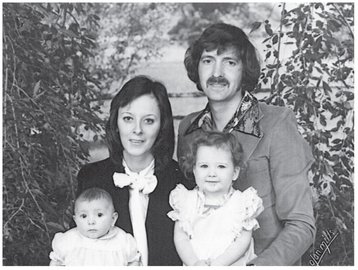
In 1977, Jack and Marie Summey lived with their two daughters, Brandy and Renee.
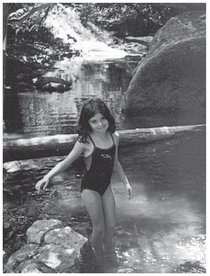
Even as a child, their youngest daughter, Renee, had the looks of a fashion model.
(Marie Summey)
(Marie Summey)

The Summeys vacationed together, visited Disney World, and enjoyed hiking in the mountains.
(Jack Summey)
(Jack Summey)
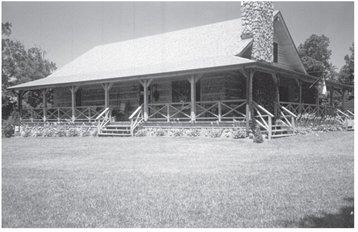
The Summeys lived in a mobile home until Jack could finish construction on their 3,000-square-foot log home in Clemmons, North Carolina.
(Jack Summey)
(Jack Summey)
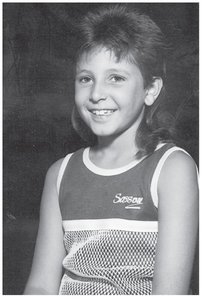
At age nine, Renee loved school and earned good grades until the other children started making fun of her, calling her “white trailer trash.”
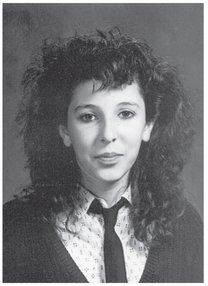
When Renee was eleven, she started to slim down. Her classmates teased her, saying she was “as skinny as an Ethiopian.”
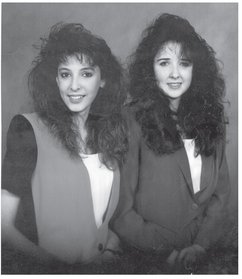
The Summey girls were only a year apart in age, yet very different in personality and temperament. Brandy, the older one, was reserved and shy, while Renee was independent and feisty.
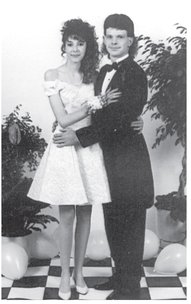
Renee was a freshman at R.J. Reynolds High School when she started dating a senior, Brent Poole. The two became inseparable.
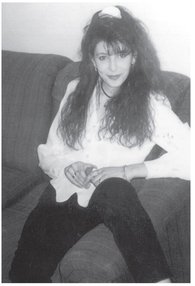
By the time Renee was seventeen, she was bored with school and chose to work instead. She and Brent had been romantically involved for almost three years. They planned on getting married when she discovered she was pregnant.
(Marie Summey)
(Marie Summey)
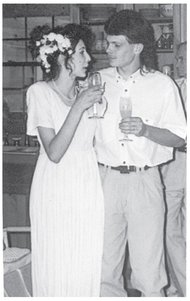
Already expecting their first child, Brent and Renee were married at the Summeys' home on June 9, 1995.
(Marie Summey)
(Marie Summey)
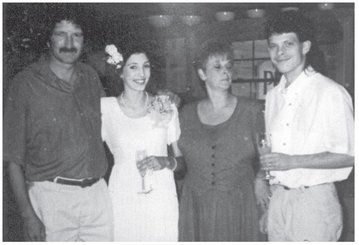
Jack and Marie Summey loved Brent and welcomed him into their family as “the son they never had.”
(Brandy Summey)
(Brandy Summey)
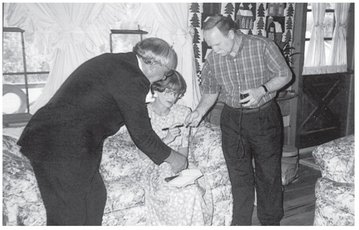
Bill and Agnes Poole wondered if their son, Brent, was making the right decision. Yet they respected him for wanting to do the honorable thing.
(Marie Summey)
(Marie Summey)
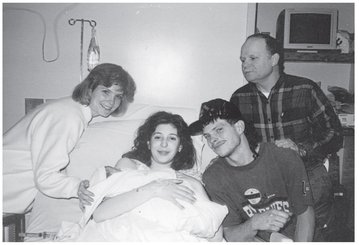
Although Renee didn't get along well with Brent's family, all was forgiven when she gave birth to Katie in December, 1995.
(Marie Summey)
(Marie Summey)
Other books
Hiding Away (Anchored Hearts #1.5) by J.M. Witt
Teaching Tara (An Age Play Story) by Shire, Devon
Queen Bee Goes Home Again by Haywood Smith
Comanche Dawn by Mike Blakely
Creeptych by John Everson
Courting Miss Adelaide by Janet Dean
Closer Still by Jo Bannister
Summer Is for Lovers by Jennifer McQuiston
The Talented Miss Highsmith by Joan Schenkar
Heather Graham - [Camerons Saga - North American Woman 02] by A Pirates Pleasure